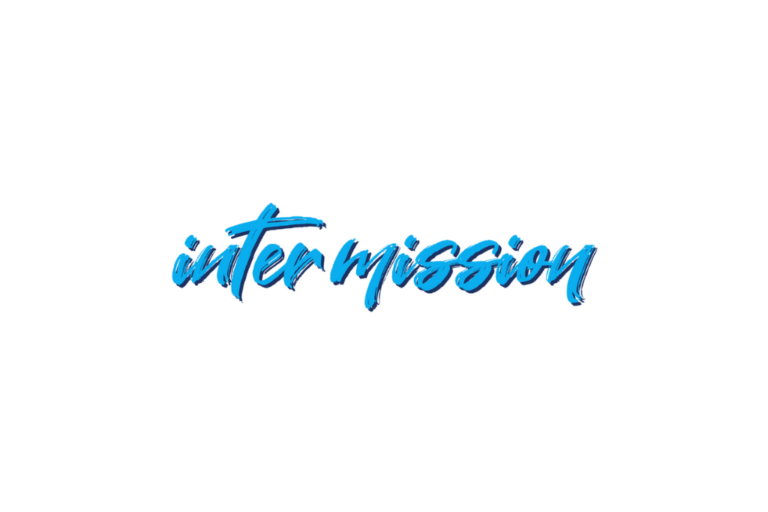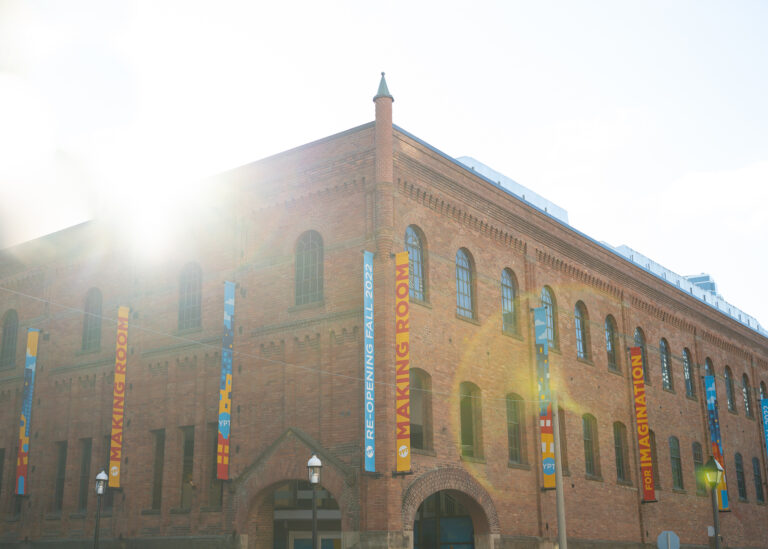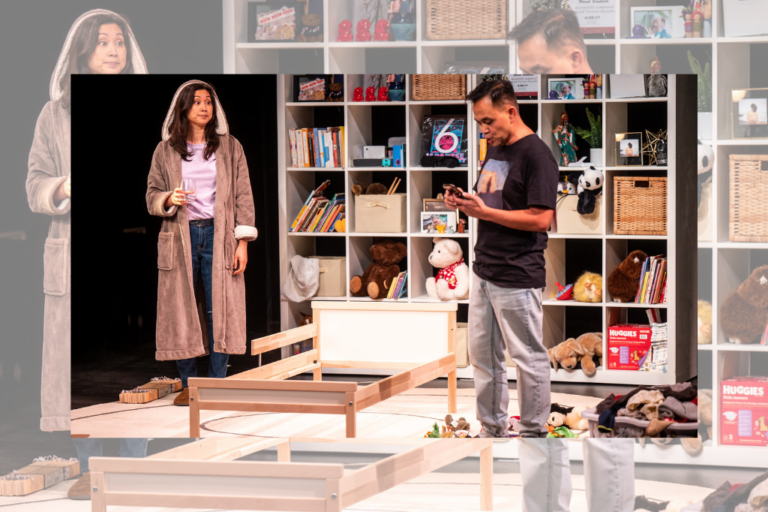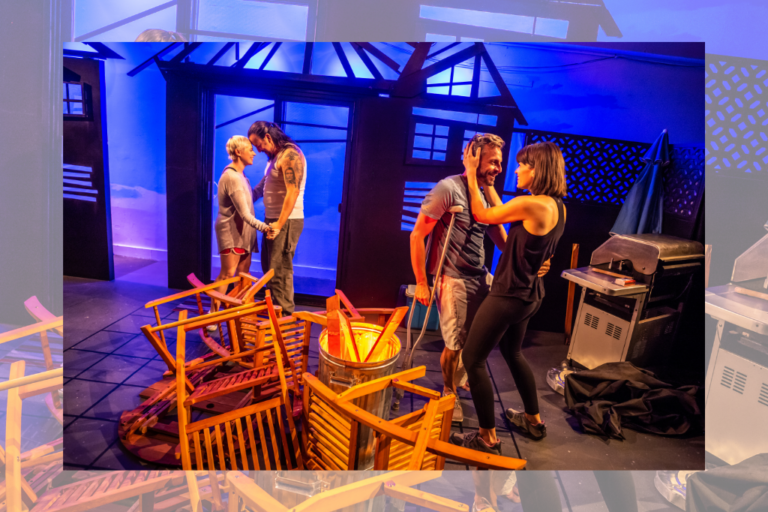REVIEW: The Antipodes at Coal Mine Theatre
“Maybe there are no more stories.”
That’s the worry of narcissistic boss-man Sandy (Ari Cohen) towards the end of Annie Baker’s magnificent The Antipodes.
“Maybe it should be the end of an era,” he continues. “Like maybe this is the worst time in the history of the world to be telling stories.”
The play had its world premiere in New York in April 2017, before we all went inside for two years and ran out of Netflix to watch. At this point, we might be inclined to agree with Sandy that story is dead. The point of Baker’s play, though, has always been to prove Sandy wrong, and the timing could not be more perfect for this celebration of the potency of stage storytelling. Ted Dykstra’s Coal Mine Theatre production made me feel like there was no better time in history to be telling and receiving stories than in this room with Baker’s wildly compelling, if not necessarily likeable characters. Dykstra’s perfectly cast, perfectly calibrated staging grips the audience’s attention throughout the nearly two hour long, intermissionless performance.
The setup of the play: nine characters are caught in an increasingly desperate situation, pitching story ideas for a project about which we learn very little. Could be TV, film, video games, escape rooms… who the hell knows? They spin tales relentlessly yet fruitlessly, and when things are just about to spiral out of control, the symbolically-named Adam dredges the mother of all stories out of his exhausted psyche.
Coal Mine’s intimacy amplifies the sense of being included in a rarified, exclusive experience. Nick Blais’ typically ingenious design has the audience looking down from raked seats into the conference room where the meeting’s taking place. There’s a one-way mirror behind them which allows the audience alternative angles on some of the characters’ interchanges, and which also cleverly masks latecomer seating (the less tall amongst audience members are advised to sit close to the action, as sightlines towards the back are challenging).
The Coal Mine is one of several independent theatre companies to have built an audience for Baker’s work in Toronto, along with Company Theatre and Outside the March. Through a rash of exemplary productions, I’ve learned how to let her plays work on me. They shimmer with multiple layers of significance and it’s best to let them unfold, knowing that what they initially seem to be about is likely not what they’re eventually going to be about, and also knowing that ‘aboutness’ is reductive of the ways in which they make meaning.
Initially, the subject matter of The Antipodes seems to be the hellscape of contemporary Western workplace culture, with a particular eye on gender politics. We know instantly that Sandy’s the bro-in-chief, not just by the way he leads the discussion but by the way longer-term employees David (Joshua Browne) and Danny M1 (Murray Furrow) are locked into his energy. Of course, the writer’s room is all male save for Eleanor (Sarah Dodd), who disrupts the culture by resisting the tyranny of group-ordered lunches and knitting under the table. And, of course Sandy’s assistant, Sarah, is female, and of course she’s perky and efficient and upsettingly implicated in his performance of power.
The casting of Kelsey Verzotti, who is of Asian heritage, in this role adds another level of potency to the production: at one point, Sandy mocks the unseen big-boss’s past advice “to hire a woman or a… or a Chinese person or whatever”, immediately followed by one of Verzotti’s perfectly timed entrances. Sarah’s impeccably good at her job and comes to act as Sandy’s enforcer, keeping the writers working and fed and watered (as manifest in a wall of boxes of Bubly, a great ongoing sight gag) while he’s increasingly absent. That she’s become complicit with him, in the face of his racism as well as his sexism, ably brings home Baker’s points about toxic workplace culture.
David and Danny M1 set the tone by sharing personal stories focused on their penises. Newcomer Josh (Colin A Doyle) attempts to stake a claim with a garbled theory about the functioning of time, which Eleanor saves by proffering a further theory about time as a spiral (an act of generosity which will come back to haunt her). We’re cued to keep an eye on soft-spoken Adam (Nadeem Philip) when he articulates an idea about having a monstrous shadow self on the opposite side of the world, which serves as Baker’s only overt hat-tip to the play’s title. Lowest-in-the pecking order Brian (Joseph Zita) types everything that’s said into his computer, the relentless nature of this action underlining the randomness and increasing futility of all this pitching – is it genius? Is it crap? Who gets to say? Why does any of this matter — if it does at all?
Simon Bracken’s character is doomed from the start for having the same name as one of the alpha dogs (he’s dubbed Danny M2). His stories are sensitive and awkward, and Bracken exquisitely communicates the character’s excruciation as he digs himself deeper into a hole of self-revelation, his cheeks growing pinker and his hands communicating the eloquence that his words cannot. It’s with a twist involving his character and the assistant Sarah’s entry into the pitching game that the play shifts into next-level Baker territory, in which the supernatural and occult weave into depictions of realistic scenes and the nature of real and unreal becomes deliciously, unsettlingly murky.
The ambiguity around what’s going on and why these stories matter becomes increasingly existential. Aided by the superb design team (lighting by Blais, sound by Andy Trithardt, costumes by Alexandra Lord), Dykstra’s production goes full phantasmagoric in a climax scene in which Zita’s Brian well and truly shakes off his role as the meek scribe. Baker brings us back to the original situation with an exquisitely disgusting (and yet elegantly foreshadowed) spit cue, and we head towards a form of resolution.
This is a play which on the page might seem wandery and fluid. It has strong Aristotelian bones, though, and Dykstra builds his staging on them. The production allows Baker’s characteristic layers of significance to unfurl and inform each other within this strong structure. What it’s left me thinking about is the relationship between storyteller and listener, and the capacity of stories to build community. The production gives a shard of hope that its exhausted group of storytellers might have found the capacity to become an audience for each other. It’s a beautiful welcome-back message from and to Toronto’s theatre community.















Comments